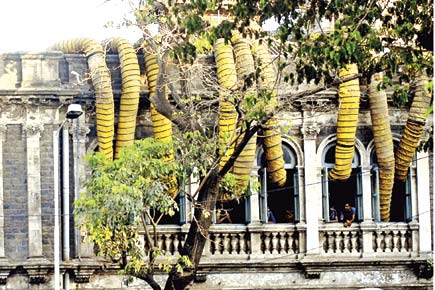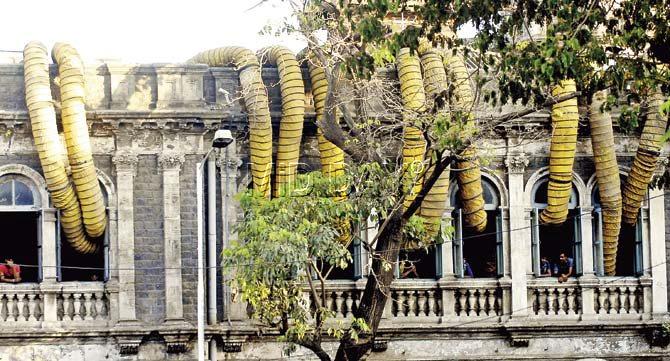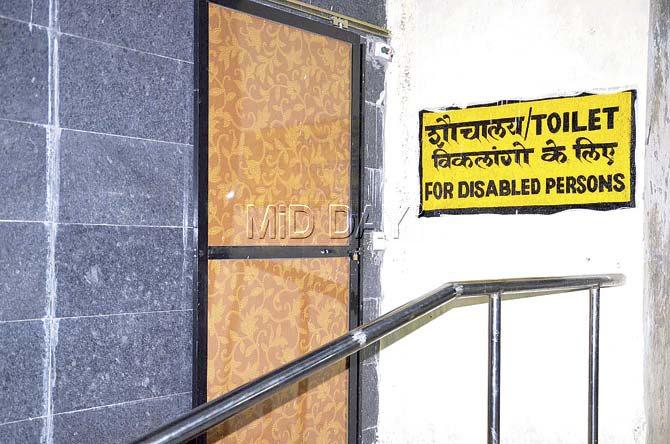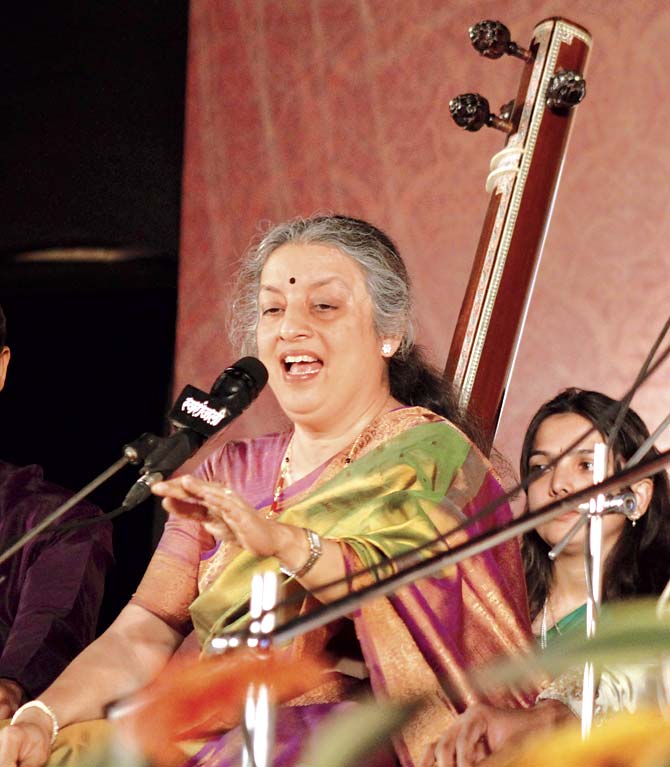The city — sliced, diced and served with a dash of sauce

Capitol capers
You may be forgiven for thinking this is a setting for a science-fiction film where alien beasts have taken over the city and are spreading their huge tentacles over all our buildings.
ADVERTISEMENT

Along with the roots of banyan and peepal trees, air-conditioning ducts too find their place on the Capitol theatre building. Pic/Suresh KK
At first sight we too were dumb-struck. But it’s not a condition that lasts long with us. We soon realised that the odd-looking things snaking out of the Capitol theatre building are only pipes carrying out exhaust from portable air-conditioners, which are used when film shootings are being carried out in the area.
The Capitol has a long history built in 1879, it began life as the Tivoli, a theatre for performing arts. It was renamed the Capitol in 1928, when movies began to be screened there. When our heritage structures are overtaken and indeed, overwhelmed by modernity, we do feel a little lost, as if our city is slipping away.
Why cinema matter(den)s
It's an age of all things television, or so it seems to us. An excursion to a cinema hall, especially if it is one in a multiplex housed in a mall, sets us back in a hefty way, so many people give movie halls a miss and wait for the titles to get released on cable or DTH ie, the small screen again.

A still from Casablanca
But the pleasure of watching a good movie in a good cinema hall is a many-layered one. More than just an outing, it is an experience. Which is what Matterden, housed at Deepak Cinema in Lower Parel, aims to do. Lovers of classic movies have a home for their indulgence, the best part being that most of the audience are also probably fellow-aficionados.
So you can meet a stranger’s eye and smile in mutual appreciation of the fine fare before you. This week, till Thursday April 9, Matterden (matterden.com) is showing Cinema Paradiso and the much-loved Casablanca. Watch them, for old times’ sake.
A toilet, but only in name
It was encouraging to see a toilet marked specifically for the handicapped, at Dombivili station on platform 1. We know that it is already difficult finding a usable toilet that does not make us run away screaming, and as it turned out, this one was scarcely any improvement.

The toilet for the handicapped at Dombivili station is no use, as it is locked and the tap is said to be broken. Pic/Shrikant Khuperkar
The door to the toilet is firmly locked which is fine, as it will prevent misuse by non-handicapped persons. But the story stops being a happy one at this point. We saw a handicapped youth, who wanted to use the toilet, go to the station-master’s office to ask for the key.
The station-master told him that there was no water in the toilet as the tap had been broken, and told the youth to “go anywhere” if he wanted to relieve himself!
When Science meets music
Dr Ashwini Bhide-Deshpande is very well known both in India and abroad as one of the country’s leading classical singers. But few know that the Jaipur Atrauli Gharana singer has also published a book, Ragarachananjali, of bandishes she composed.

Dr Ashwini Bhide-Deshpande
Here’s more to the literary side of the singer. A little songbird tells us, she will soon release her second book. Titled Madame Curie, it is a Marathi translation by Bhide-Deshpande, of the book by Eve Denise Curie Labouisse, on her mother, Marie Curie.
Eve, the only non-scientist in her family, was a journalist and author who wrote the biography of the Nobel prize-winning physicist and chemist. Bhide-Deshpande’s fascination with Science is also not new. She has a Master’s degree in Microbiology and a doctorate in Biochemistry.
With a background that’s both musical and scientific, the translator is sure to have done a ‘note’ worthy and thorough job. And there’s more. Dr Bhide-Deshpande’s family has the addition of another ‘Dr’ to the family.
Her daughter Niranjani, a graduate research associate at The Ohio State University, has just completed her PhD. Congratulations Dr Bhide-Deshpande and Dr Deshpande!
 Subscribe today by clicking the link and stay updated with the latest news!" Click here!
Subscribe today by clicking the link and stay updated with the latest news!" Click here!






